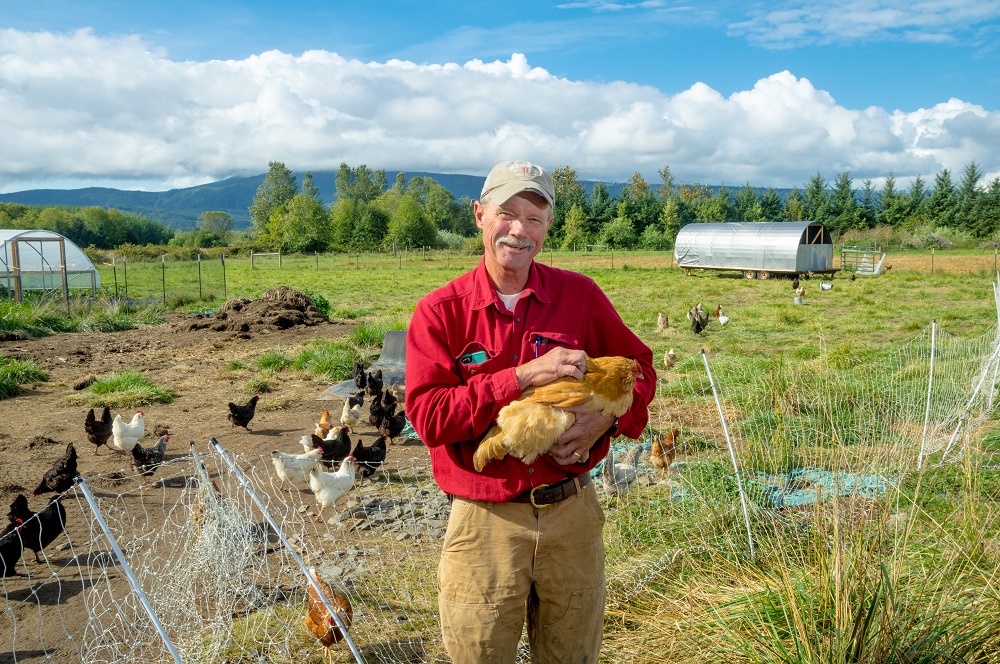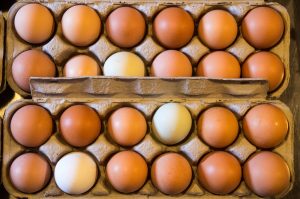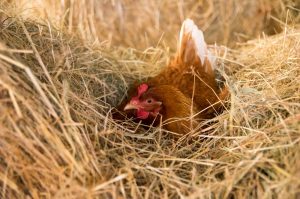 By Emily Renne Vollmer
By Emily Renne Vollmer
Photos by Trav Williams, Broken Banjo Photography
A soft clucking from high up in the hay bales reveals a hen nestled on a clutch of eggs. Farmer Bruce Craven mentions in a patiently exasperated tone that some in the flock know that they can fly, and this is one of those hens who flies over the fence, and waits for him to open the door so she can get to her favorite spots in the barn.
Backwater Farm, run by Bruce and wife Desiree, delivers fresh eggs to the Astoria Co-op once a week. Their 40-acre farm on Puget Island is named for the peaceful backwaters of the Columbia River that border their pastures in the form of the East and West Sturgeon Sloughs.

A diverse flock of hens are fanned out across the red stems of mowed buckwheat: Black Australorp, Speckled Sussex, Welsumer, Novogen Brown layers, Americauna and other breeds. The buckwheat cover crop was planted to improve soil tilth after the heavy traffic of pasturing their heritage Lowline Angus beef cattle over the winter. In midsummer, when the buckwheat bloomed, it became a source of nectar for their honeybees, and now the chickens scratch for fallen grain and insects. A henhouse that Bruce custom built on the frame of an old Winnebago trailer can be pulled with a tractor to rotate the chickens through the fields. These integrated natural and sustainability-focused farming practices are central to how Backwater Farm is managed.

The eggs from these free-range chickens are flavorful and have rich orange-yellow colored yolks due to their varied diet. In contrast to chickens raised in confinement, these chickens also lay fewer eggs since they expend more energy when they run about and forage.
In Bruce’s packing room, the eggs fill the cartons in orderly rows with colors ranging from creamy brown to chocolate, and the occasional teal or white egg. They’re packed as ungraded eggs, which means that they aren’t sorted by size so each dozen contains a mixture of small to extra-large eggs. In general the small eggs are laid by younger chickens, and a hen lays larger eggs as she gets older.
While delivering to the Astoria Co-op one week, Bruce was walking in with cartons of eggs when a family approached him and said, “You’re the egg guy?! Can I shake your hand?” They shared that the kids really enjoyed the eggs from Backwater Farm.
 Bruce compliments the Astoria Co-op on how great they have been to work with. The Co-op has been understanding of the realities of sourcing from small scale local farms, and they’ve been willing to accept the natural, seasonal fluctuations in egg production, or unexpected demands of the farm that might delay a delivery.
Bruce compliments the Astoria Co-op on how great they have been to work with. The Co-op has been understanding of the realities of sourcing from small scale local farms, and they’ve been willing to accept the natural, seasonal fluctuations in egg production, or unexpected demands of the farm that might delay a delivery.
The constant need for problem-solving and creativity is an engaging aspect of farming for Bruce. “More often than not, I don’t decide what I’m going to do; the farm tells me what I’m going to do for the day.” There are frustrations, like the fence he spent several hours on only to have a hen fly over it two minutes after he’d finished. On the other hand they also find themselves part of a community on Puget Island where neighbors will come over to help out when needed. He finds he enjoys the daily variety and physical activities.
Bruce’s first connection with Puget Island was as a place to go fishing when he worked and lived in Portland. While technically retired now, Bruce is too busy to go fishing as he and Desiree build and manage the farm so that the chickens, beef cattle and honeybees contribute to the mortgage. Yet, he says they find their days are pretty rich and full.